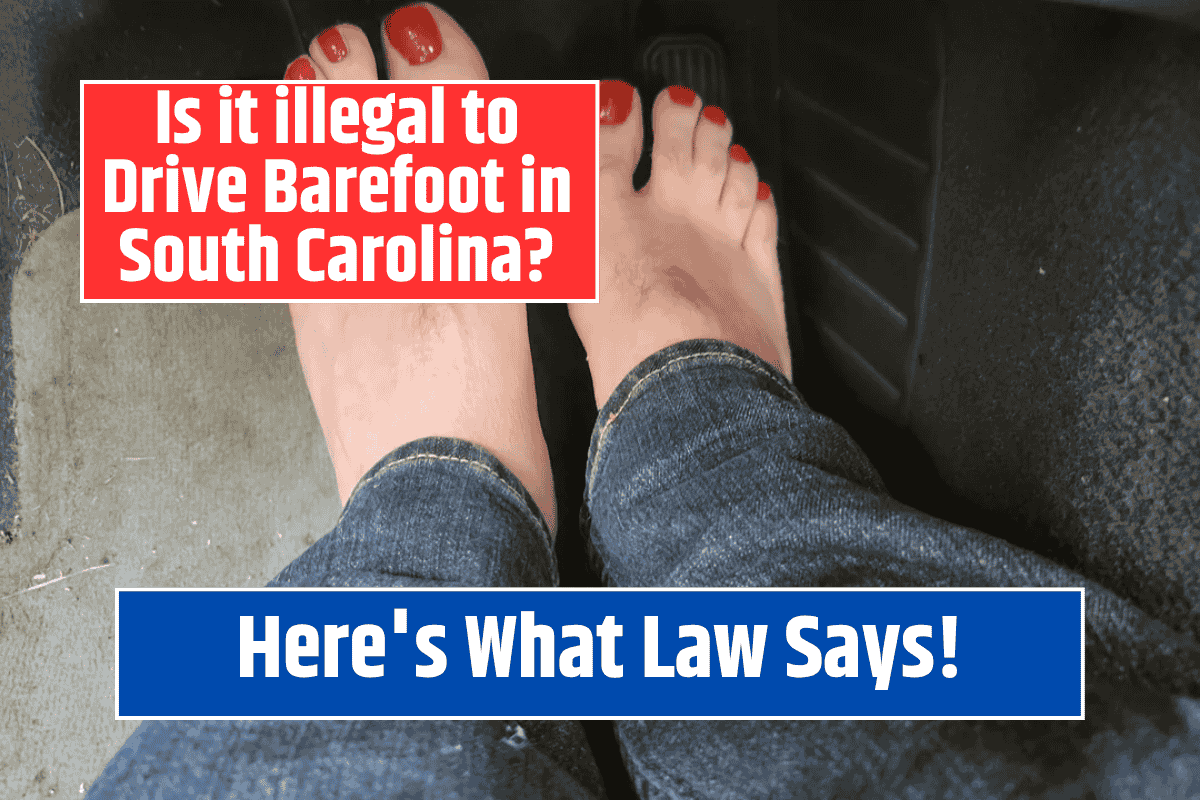Many drivers are curious about whether it’s legal to drive barefoot in South Carolina. Some people assume that driving without shoes could result in a traffic ticket or even cause an accident.
However, the truth is that it is completely legal to drive barefoot in South Carolina, as well as in all other U.S. states. But just because it’s legal doesn’t necessarily mean it’s always the safest or most advisable choice.
South Carolina Law on Barefoot Driving
South Carolina has no law that specifically prohibits driving without shoes. This means that, unlike seat belt laws or texting and driving laws, you won’t be fined or ticketed simply for driving barefoot.
According to sources like the Beach Automotive Group and The Law Offices of Jared Spingarn, P.A., there is no federal or state law that bans driving barefoot.
In fact, this belief that driving barefoot is illegal has become somewhat of an urban legend in the U.S. While some people are under the impression that it’s against the law, the reality is that there are no restrictions on driving barefoot in South Carolina or any other state.
Driving in Flip Flops: Is It Legal?
Similar to barefoot driving, driving in flip flops is also legal in South Carolina. There are no laws against wearing flip flops while driving, and the law doesn’t specifically regulate what type of footwear is acceptable when operating a vehicle.
FindLaw.com confirms that there are no traffic statutes in South Carolina that list acceptable or unacceptable footwear for drivers.
However, while it’s legal, flip flops and other loose-fitting footwear can be problematic. The same potential hazards exist with flip flops as they do with barefoot driving: they can slip off your foot or become caught between the gas and brake pedals, leading to a possible accident.
Safety Concerns: Why Barefoot Driving Might Not Be a Good Idea
Even though it’s legal to drive barefoot in South Carolina, it may not be the safest choice. Here are a few safety concerns to consider:
Loss of Traction: Bare feet don’t offer the same grip as shoes, making it easier for your foot to slip off the pedal. In wet or slippery conditions, this could lead to difficulty controlling your vehicle.
Foot Getting Caught: There’s also the risk of your foot or socks getting caught under the pedals, especially if you’re driving without shoes. This could cause an unexpected and dangerous situation.
Flip Flops: While flip flops are a popular choice for some, they can slide off your feet while driving. This makes it harder to maintain control over the pedals and can lead to distractions, which are major causes of accidents.
While some people believe that barefoot driving allows for better control and sensitivity when pressing the pedals, the risks of losing control due to a slip or distraction are real. Wearing shoes with proper soles and good traction is recommended for the best control and safety.
Court and Insurance Considerations
Although it’s legal to drive barefoot, there could still be consequences if you’re involved in an accident. Here’s why:
Negligence or Recklessness: If you cause an accident while driving barefoot, the other driver could argue in court that your choice to drive without shoes was negligent or reckless. The court may rule against you if it’s determined that not wearing shoes contributed to the accident. This is more likely in cases where lack of proper footwear makes it harder to control the vehicle.
Insurance Coverage: Some car insurance companies may be reluctant to cover drivers involved in accidents when they’re not wearing proper footwear. Insurers often consider driving barefoot to be more dangerous, and they may use this as a reason to limit or deny coverage. If they can prove that driving barefoot contributed to the accident, it may affect your ability to receive compensation.
What Happens if You’re Involved in a Car Accident?
If you’re involved in a car accident while driving barefoot, you may not face legal consequences just for not wearing shoes. However, the circumstances of the accident and the investigation will still determine who is at fault. If it’s found that driving barefoot was a contributing factor to the accident, you could face a personal injury lawsuit from the other party.
In this case, the other driver may seek compensation for medical bills, lost wages, and other damages. Additionally, your insurance company may attempt to reduce or deny your claim if they believe that driving barefoot increased the risk of the accident.
The Bottom Line: Should You Drive Barefoot in South Carolina?
While driving barefoot is legal in South Carolina, it’s important to consider the safety risks involved. Even though the law doesn’t forbid it, driving barefoot can lead to dangerous situations if you lose control of the vehicle or cause an accident due to lack of traction or distractions.
Similarly, driving in flip flops or other loose footwear carries its own risks.
If you decide to drive barefoot, make sure that your feet are dry and have enough grip to maintain control over the pedals. If you’re not comfortable driving without shoes, it’s always a good idea to keep a pair of proper driving shoes in your car. The goal is to ensure the safest driving experience for yourself and everyone else on the road.












